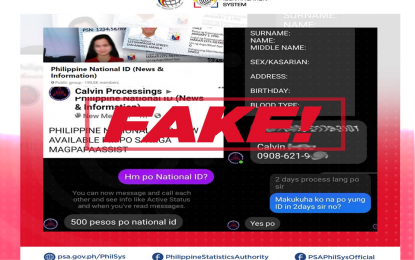
SCAM. The Philippine Statistics Authority warns the public against scammers posing as employees facilitating registration for the Philippine Identification System (PhilSys) in this undated infographic. It also reminds the public that the registration under PhilSys is free of charge. (Photo courtesy of PSA)
MANILA – The Philippine Statistics Authority (PSA) has cautioned the public to be vigilant against scammers posing as employees who facilitate registration for the Philippine Identification System (PhilSys).
In an advisory on Saturday, the PSA said it has been receiving reports that some individuals have been posing as part of the PhilSys team, who are unlawfully processing the Philippine identification card (PhilID) with corresponding charges.
According to the PSA, some members of a certain community group with Facebook account 'Philippine National ID (News & Information)' and an individual branding himself as 'Calvin Processings' reportedly is collecting fees for the PhilID registration.
Some of the modus of these fake accounts are luring their target victims by posting deceptive information such as giving prioritization to their supposed clients for the PhilSys' registration. They also ask clients to pay for continuous transactions.
The PSA, meanwhile, reminded the public that the registration under PhilSys is free of charge.
It also emphasized that acquiring the national ID would be free for all Filipinos and shall comply with the Data Privacy Act of 2012 wherein the collection of data and information would be automatically be encrypted into the PSA server.
Those captured personal data and information should be directly posted in the PhilSys registry for protection and should not be disclosed on social media.
PSA warned the public that the genuine PhilSys personnel should properly introduce themselves, representing the PSA office and the PhilSys project.
People were told to immediately report fake posts, pages, or individuals with illegal activities and transactions related to the PhilSys project.
The public is also urged to transact with legitimate PSA field personnel.
Netizens can report illegal activities related to PhilSys to the PSA PhilSys' official account via link https://www.facebook.com/PSAPhilSysOfficial or may call at PhilSys hotline at 1388 (call is not free).
PSA said the PhilSys registration has three steps involves pre-registration, registration, and issuance of the PhilID.
Under the Step 1 pre-registration process, the PSA field officers are initially operating house-to-house collection of demographic information of the targeted low-income household heads from 664 cities and municipalities of the 32 identified province including Ilocos Sur, La Union, Pangasinan, Cagayan, Isabela, Bataan, Bulacan, Nueva Ecija, Pampanga, Tarlac, Zambales, Batangas, Cavite, Laguna, Quezon, Rizal, Albay, Camarines Sur, Masbate, Antique, Capiz, Iloilo, Negros Occidental, Bohol, Cebu, Negros Oriental, Leyte, Compostela Valley, Davao Del Norte, Davao Del Sur, Davao Occidental, and Tawi-Tawi.
Step 2 is the registration process which involves the validation of supporting documents and capturing the registrants' biometric information, such as fingerprints, iris scans, and front-facing photographs at the registration centers.
While Step 3 of the PhilSys registration is the issuance of a physical ID card stored with a 12-digit PhilSys number or personal serial number (PSN) and a 16-digit PhilSys card number (PCN).
PSA said those who are planning to use the PhilSys project for scam and fraud purposes or those who will be caught providing unauthorized issuance of PhilID will face criminal charges.
Scammers will be penalized with a fine of PHP1,000,000 to PHP3,000,000 and/or imprisonment of three years, in accordance with the Implementing Rules and Regulation (IRR) of the R.A. No. 11055 or the Philippine Identification System Act.
Signed into law by President Rodrigo R. Duterte in August 2018, Republic Act 11055, or the Philippine Identification System Act, aims to establish a single national ID for all Filipinos and resident aliens.
The national ID shall be a valid proof of identity that shall be a means of simplifying public and private transactions, enrollment in schools, and the opening of bank accounts.
It will also boost efficiency, especially in dealing with government services where people will only need to present one ID during transactions. (PNA)
